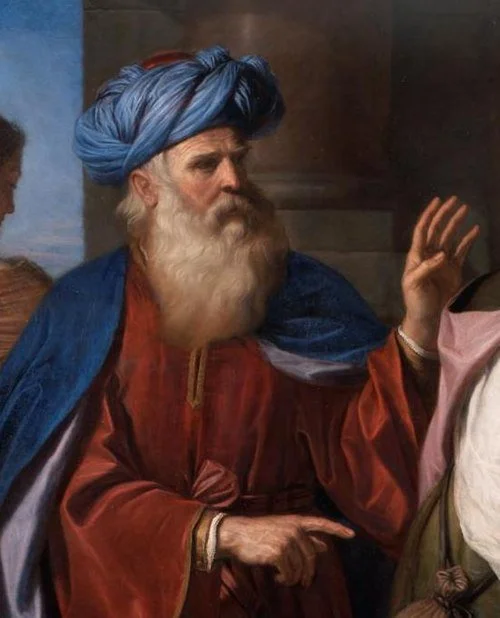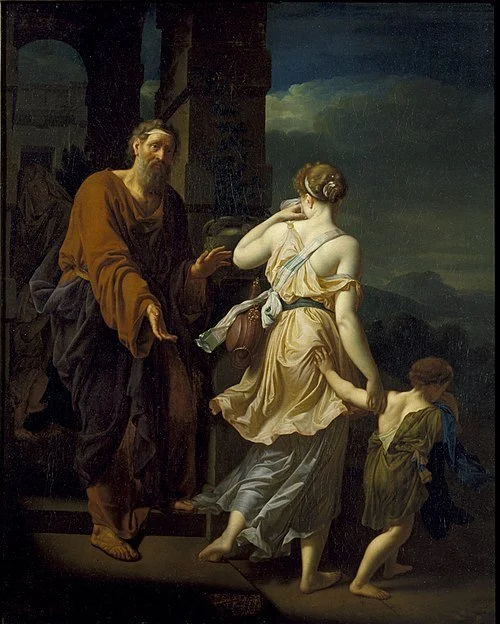Bible Study Notes - Genesis Chapters 12-22: Abraham and Isaac
Abraham by Guercino (W.Commons)
‘Scripture taken from the New King James Version. Copyright © 1982 by Thomas Nelson. All rights reserved.’
Chapter 12 opens with the Lord saying to Abram:
“Get out of your country,
From your family
And from your father’s house
To a land that I will show you.
I will make you a great nation;
I will bless you
And make your name great;
And you shall be a blessing.
I will bless those who bless you,
And I will curse him who curses you;
And in you all the families of the earth shall be blessed.”
The repeated phrase here is, “I will…”, pointing to God’s promises, which are more important than Abram’s faith.
Having said that, Abram heard God, trusted in Him and acted on God’s promises even though he had no way of knowing if any of it would come to fruition.
He left his home and all that was familiar to him at the age of 79, and journeyed into strange lands, fully trusting that God would keep him and show him the way.
Yet, he wasn’t fully obedient to God who had told him to “Get out… from your family”; when he left, Abram took his nephew, Lot, with him.
In 13:12, we are told ‘Abram dwelt in the land of Canaan, and Lot dwelt in the cities of the plain…’
In 13:14-16, after Lot had left, ‘… the Lord said to Abram… “Lift your eyes now and look from the place where you are – northward, southward, eastward, and westward; for all the land which you see I give to you and your descendants forever. And I will make your descendants as the dust of the earth…”’; that is quite the promise to make to a childless man in his 80s, yet Abram did not question God.
In 15:3, instead of denouncing God, Abram brought his misgivings to Him: ‘“… You have given me no offspring…”’ and God reassured him that he would have an heir.
In 15:5, the Lord said, ‘“Look now toward heaven, and count the stars if you are able to number them… So shall your descendants be.”’
‘And he believed in the Lord, and He accounted it to him for righteousness.’ (15:6)
Abram showed his faith by trusting in God’s promises, thus he was regarded as righteous before God.
His righteousness (the quality of being right in the eyes of God) was not because of anything he’d done but was a gift of God through Abram having faith; God had made his promise through His grace alone, and all Abram needed to do was receive it with faith.
And yet, despite that faith, instead of waiting on God’s promise, Abram tried to work things out himself.
Abraham, Sarah and Hagar (Bible Pictures with brief descriptions by Charles Foster - W.Commons)
In chapter 16, his wife, Sarai, having borne no children, gave her Egyptian maid, Hagar, to Abram, so she could bear him a child, and the result of this union was Ishmael, born when Abram was 86 years old.
In chapter 17, the Lord made His covenant with Abram, then aged 99.
‘“… My covenant is with you, and you shall be a father of many nations. No longer shall your name be Abram, but your name shall be Abraham… I will make you exceedingly fruitful; and I will make nations of you, and kings shall come from you. And I will establish My covenant between you and your descendants after you in their generations, for an everlasting covenant, to be God to you and your descendants after you. Also I give to you and your descendants after you the land in which you are a stranger, all the land of Canaan, as an everlasting possession; and I will be their God.”’ (17:4-8)
Abram meant ‘exalted father’ and Abraham, ‘father of many’.
God also said, ‘“As for Sarai your wife… Sarah shall be her name. and I will bless her and also give you a son by her; then I will bless her, and she shall be a mother of nations; kings of peoples shall be from her.”’ (17:15-16)
The meaning of her names seems to suggest that Sarai means ‘my princess’, that is, confined to one family, whereas Sarah signifies ‘a princess’ as in the princess of many.
In His covenant, the Lord increased the promises He’d made to Abraham in chapter 12 with ‘a great nation’ becoming ‘many nations’, and “… kings shall come after you…”.
God promised the covenant would be an everlasting one, not only for Abraham but for his descendants, unborn, and for generations to come, and that the land would also be passed to his descendants “as an everlasting possession.”
Most importantly, the Lord stated He would be their God.
Despite Abraham’s and Sarah’s doubts, Sarah did bear a son to Abraham when he was 100 years old, and the child was named Isaac (chapter 21).
While Isaac was still young, Sarah wanted Hagar and Ishmael to be sent away after she caught Ishmael scoffing at Isaac, but Abraham was reluctant because Ishmael was also his son (21:9).
Conflict between the two was inevitable as Ishmael was already a young teenager; in Galatians 4:22-29, Paul used this to show the conflict between those born of the promise, that is, God’s promise, and those born of the flesh, when we try to control the outcome.
God told Abraham to listen to Sarah, but He assured him that while ‘“… in Isaac your seed shall be called”’, He would also ‘“make a nation of the son of the bondwoman, because he is your seed.”’ (21:12-13)
The Expulsion of Hagar and Ishmael by Adriaen van der Werff (W.Commons)
In chapter 22, the strength of Abraham’s faith was tested by God.
God said, ‘“Take… your only son Isaac, whom you love, and go to the land of Moriah, and offer him there as a burnt offering on one of the mountains of which I shall tell you.”’ (22:2)
God referred to Isaac as Abraham’s only son as Ishmael had been sent away and the covenant was only meant for Abraham’s descendants through Isaac.
Isaac, as a burnt offering, would need to be killed first as a sacrifice; human sacrifice was something the people of Canaan practiced, believing their gods demanded it.
As Abraham wasn’t a Canaanite, I wonder if he thought the Lord wasn’t that different from pagan gods after all.
Also, if God wanted Abraham to kill Isaac, what about the promise ‘“… in Isaac your seed shall be called”’? (21:12)
Here, we’re shown the difference between trusting the promise and trusting God, the one who made the promise.
When we trust the promise more than God, that leads us to do all we can to make sure that promise comes to pass instead of trusting God and leaving it to Him.
“It is neither your business nor mine to fulfil God’s promise… For us is duty, for God is the fulfilment of His own promise…” – Charles Spurgeon.
Yet even though he surely did not understand, Abraham still obeyed God without question.
Abraham and Isaac made the three-day journey with two of Abraham’s men, and when they reached their destination, he instructed them to wait while he and Isaac would ‘“… go yonder and worship, and we will come back to you.”’ (22:5)
Notice he said “we”; Abraham didn’t know how, but he had faith that both, he and Isaac, would return because, even if Isaac died, God would restore him for God had promised Abraham’s seed would live on in Isaac.
As they went together, Isaac asked his father where the lamb for the burnt offering was.
‘And Abraham said, “My son, God will provide for Himself the lamb for a burnt offering.”’ (22:8)
The first couple of times I read this chapter, I didn’t make the connection until I started using the study Bible; the sacrificial lamb mentioned here points to the coming of Jesus – ‘“Behold! The Lamb of God who takes away the sin of the world!”’ (John 1:29)
Once Abraham had built the altar and laid the wood on it, ‘he bound Isaac his son and laid him on the altar, upon the wood.’ (22:9)
Again, thanks to the study Bible, I took note of the strength of Isaac’s faith.
Abraham would have been over 100 years old at this point and Isaac, being a young man, could easily have overpowered his father and broken free.
Yet, he clearly didn’t fight his father but willingly laid himself on the altar, which means he knew what was about to happen.
‘… Abraham stretched out his hand and took the knife to slay his son.’ (22:10); this surely meant that Abraham was prepared to sacrifice his son, having complete faith that God would raise him up again.
In that moment, ‘the Angel of the Lord called to him… “Do not lay your hand on the lad… for now I know that you fear God, since you have not withheld your son, your only son, from Me.”’ (22:12)
With this, God showed He was not like the pagan gods for He unequivocally did not want human sacrifice.
Sacrifice of Isaac by Rembrandt (W.Commons)
The phrase ‘fear God’ used to confuse me, thinking it meant being afraid of Him.
But I now understand that it’s to do with loving God, with respecting and obeying Him, and worshipping Him.
It’s to do with wanting to please Him as we wanted to please our parents when we were children.
And like the best Father, He is good and loving, and when He disciplines us, it’s for our own good because He cares for and loves us.
So, Abraham fearing God meant he loved God, and he showed his love and commitment with his willingness to give God his only son.
Similarly, in demonstrating the profound depth of His love and commitment to us, God gave us His Son.
Then Abraham saw ‘… a ram caught in a thicket by its horns’ (22:13), and he took it to offer as a burnt offering as God still required a sacrifice and He Himself provided a substitute.
The ram on the mountains of Moriah (Gospel Images)
The symbolism here is quite incredible – the ram has been interpreted as a foreshadowing of Jesus Christ, the ultimate sacrificial lamb offered for our sins, the substitute provided by God, and the ram caught in the thicket by its horns is seen as a representation of the crown of thorns Jesus would wear at His crucifixion.
Not only does this connect the Old and New Testaments, it also demonstrates the fulfilment of God’s plan through our Lord Jesus Christ.




